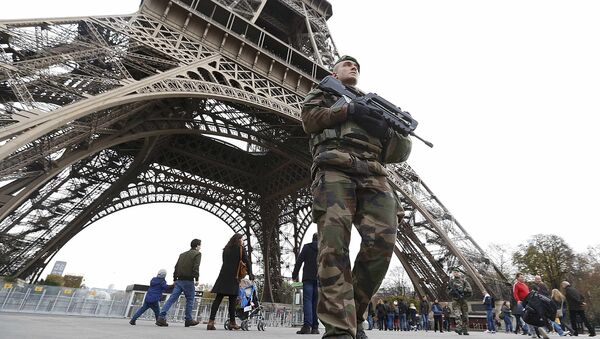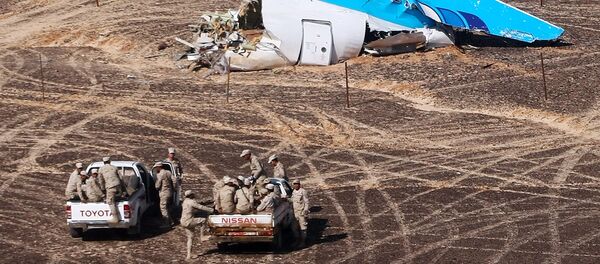Blogger Ania Dorn sent Russian Internet abuzz a couple of days ago when she published an article, arguing that both the Kogalymavia Airbus A321 that crashed in the Sinai Peninsula two weeks ago and a series of terrorist attacks in Paris last Friday were orchestrated by the Russian Secret Service. Let that sink in for a moment…
Dorn is the pen name of a previously unknown journalist who writes in Russian. However, after she published the scandalous article, her post was then shared more than 18,000 times and received over 20,500 “likes” in just two days.
Dorn’s main point is that the Russian Secret Service was behind both accidents, as the plane crash and the terrorist attacks in Paris both benefit Russia.
Now, although I enjoy reading conspiracy theories and even think that some of them might have a degree of validity to them, Dorn’s arguments seem pretty crazy at best. I don’t buy into her argument not because I have a high regard for the Russian Secret Service and believe that the Russian government couldn’t have killed so many of its own citizens, but simply because of the inconsistencies and the lack of in-depth analysis in Dorn’s argument.
Upon careful analysis and with a bit of fact-checking [something that everyone who calls themselves a journalist should do before publishing a story], Dorn’s argument falls apart at the seams. Alright, let's set the record straight.
Kogalymavia’s Airbus A321 Crash
By now we already now that an onboard explosion was the cause of the plane crash in Sinai, according to an official statement from the Russian Security Service (FSB). First of all, if the FSB was truly behind the plane crash, then why would it be so eager to point out that an explosion was the cause of the accident? Why would the FSB be so eager to find out what really happened to the plane and reveal the cause of the accident to the public right away?
Dorn went on to say that terrorists couldn’t have organized the plane crash, because both an explosive device and a detonator would be much too complex for terrorists to use.
It’s widely documented that a bunch of CIA weapons ended up in the hands of ISIL, the Nusra Front and other terrorist organizations in the Middle East. Thus, it’s entirely possible for ISIL to plant a modern explosive device on board a plane.
Then Dorn argued that the Russian government didn’t like the idea of Egypt expanding the Suez Canal, because it would significantly increase the supply of oil transported to Europe via the canal, thus lowering global oil prices even further. By organizing the plane crash in Egypt, the Russian Secret Service made Egypt look unstable and filled with terrorists, so potential sponsors of the Suez Canal expansion would think twice before investing in the Egyptian project, Dorn said.
The problem with this argument is that Russia isn’t the only oil exporting country. Saudi Arabia, the United Arab Emirates and Qatar are all oil exporting countries that would also suffer if Egypt manages to expand the Suez Canal. Now I don’t want to point fingers at anybody, but all three Persian Gulf countries have much larger sectors of their economies dependent on oil exports than Russia. Plus, the three Arab states had [perhaps still have] documented ties with Islamic extremists in the Middle East, including ISIL.
Dorn also brought up the argument that after Italy’s Eni discovered a large gas field in the Mediterranean Sea near the Egyptian coast and Eni proposed to develop the gas industry in Egypt, Russia couldn’t stand having a competitor in the gas market and therefore its secret service organized a terrorist act to damage Egypt’s reputation and scare the Italian company away from the country.
Well, that’s just ridiculous. When did major oil and gas companies shy away from conflict zones? On the contrary, they seem to love conflict zones, because areas with a weak central government are magnets for oil and gas corporations, because they can easily bypass government regulations, pay no taxes [or very little] and ignore environmental responsibility. Look at Halliburton, Royal Dutch Shell and BP, which all have oilfields in Iraq despite the country being a total mess in terms of security [with a strong ISIL presence in the country]. And what about Nigeria, South Sudan and Libya? I’m pretty sure Egypt is more stable than these countries.
Lastly, the development of the gas industry in Egypt would certainly upset Israel, since its Leviathan gas field would have a serious competitor right next door in the Mediterranean.
So, even if a competition for resources possibly was behind a terrorist act, one should consider the interests of Egypt’s neighbors before pointing the finger at Russia.
Paris Terrorist Attacks
Dorn starts out saying that Middle Eastern refugees weren’t behind the attacks in Paris, as the tightening of security services and anti-immigrant rhetoric in Europe that resulted in the aftermath of the Paris attacks aren’t what refugees want. They won’t shoot themselves in the foot by carrying out terrorist attacks in France or anywhere in Europe right now. So, if Middle Eastern refugees weren’t behind the Paris attacks, then it must be the Russian Secret Service, Dorn argued.
Well, of course regular Middle Eastern refugees didn’t do anything, as it would be against their own interests. However, ISIL, which by the way already claimed responsibility for the Paris attacks, wants exactly that – they want the EU to stop the flood of refugees, so poor asylum seekers don’t end up in Europe and instead remain stuck in ISIL-controlled territories.
US media reported that ISIL is struggling to keep its economy afloat due to the large number of people fleeing the caliphate. With regular folks escaping ISIL-controlled territories, the terrorists are finding it hard to raise funds through taxation. Furthermore, a large number of professionals are fleeing from the caliphate, resulting in a lack of qualified personnel for ISIL.
How could ISIL prevent this? Considering that many Europeans aren’t particularly happy about the increasing number of refugees, it’s in the interest of the terrorist group to organize a series of attacks in Paris, so the EU then would take harsh measures against refugees. As a result, ordinary refugees who have nothing to do with ISIL wouldn’t be allowed to enter the EU and have nowhere to go, but to stay under the reign of the terrorist group. Bingo! Both the EU and ISIL win, with the exception of the poor Syrian refugees.
Dorn went on to state that the attackers were fair-skinned and spoke really good French, so that’s why they must be Russian agents. Well, that’s the part that made me laugh. Since the rise of ISIL, more than 1,500 French citizens joined the terrorist group. Many of them came back. Many of them are “fair-skinned.” They obviously speak “very good French” too.
Some of the attackers in Paris wore explosive belts to detonate themselves. Dorn said that this method hasn’t been used anywhere in the past, except in Russia where it was the method of choice for Chechen terrorists. That’s why Dorn concluded that the Russian Secret Service must have orchestrated the Paris attacks, having learned how to use explosive vests from the Chechens.
If Dorn did even a little bit of research, she’d find out that explosive vests were used in many terrorist attacks across the world, including last week’s bombings in Beirut that killed 44 people.
One of Dorn’s other arguments was that a Montenegrin man, arrested in Germany’s Bavaria, was suspected of having ties with attackers in Paris. She went on to say that the Montenegrin man was none other than a Russian Secret Service agent, because the former Yugoslavia had close ties with the Soviet Union’s KGB in the past. But the author failed to acknowledge that since that time, a lot of water has passed under the bridge: neither country exists anymore and the Yugoslav wars certainly shifted the entire balance of power in the Balkans to the point of no recognition, destroying whatever links the KGB [that doesn’t even exist anymore!] might have had in Montenegro.
There were other points that Dorn made, but they were speculations and lacked any formal evidence.
If there truly was even a sliver of real evidence that the Russian Secret Service orchestrated the Paris attacks, the entire Western media would have torn Russia apart. I’m pretty sure that editors at the New York Times, CNN or the BBC would have started up a massive anti-Russian media campaign and set all the dogs on the Russian government if they found any evidence of the Russian Secret Service being behind the Paris attacks.
We all want 15 minutes of fame, but what Ania Dorn did doesn’t deserve attention. Her facts are incorrect and arguments are invalid, mere speculations born out of her own wrong assumptions and ignorance.


